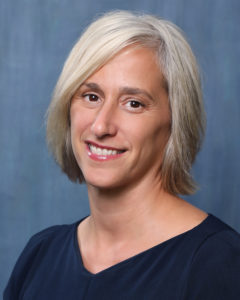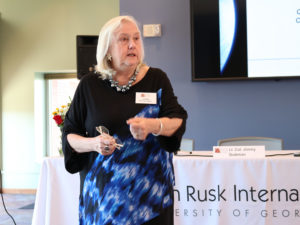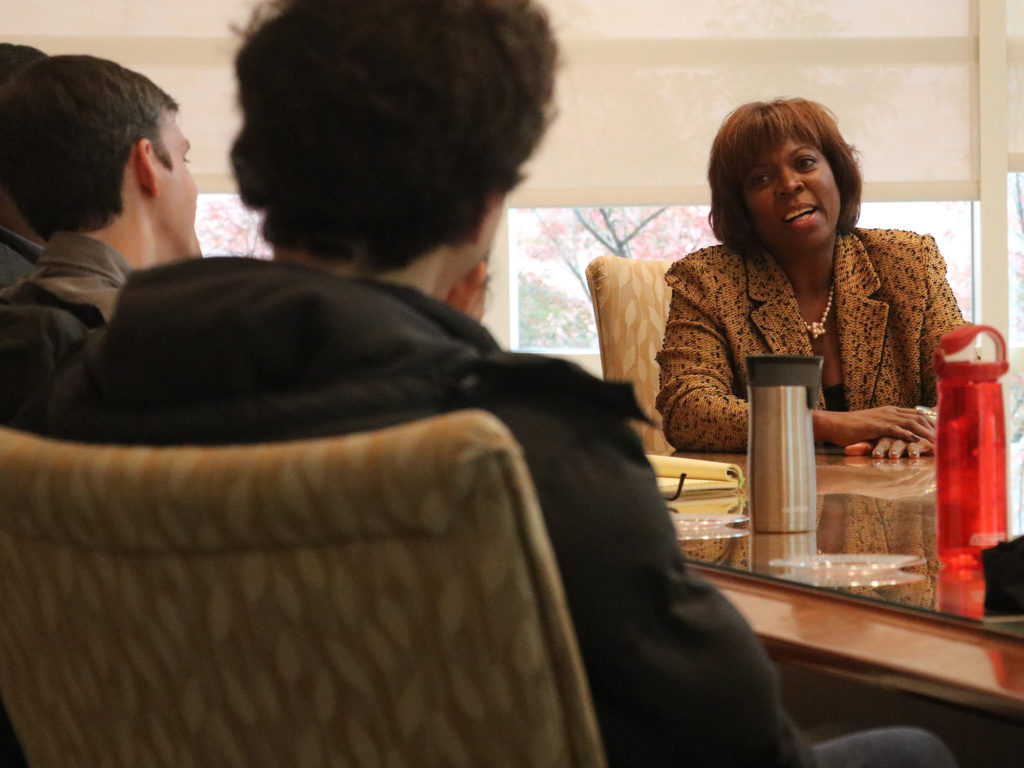
Hosch Professor Lori Ringhand became the interim director of the Dean Rusk International Law Center in January.
The Dean Rusk International Law Center – the School of Law’s nucleus for international law and policy relating to education, scholarship and other collaborations – demonstrated tremendous resilience this past academic year. Significant changes in programming became essential when the novel coronavirus spread throughout the globe affecting students, faculty and a diverse array of local and global partners.
Most of the Master of Laws students – comprised of 16 lawyers from 13 countries – faced unique challenges in mid-March when UGA pivoted to online instruction. Impressively, all of these students completed their studies to receive their diplomas in May. The School of Law also moved quickly to help incoming LL.M. students. For the first time, the law school will offer a January start for this degree, enabling foreign-trained lawyers to continue to take advantage of the opportunities provided by the school’s robust Master of Laws program.
One of the hallmark offerings of the center – Global Externships (which provide global practice experience through opportunities in the United States or overseas) – continued on a limited basis through a partnership with Orange – one of the largest mobile and internet services operators in Europe and Africa. Thanks to alumnus Johan Van den Cruijce (LL.M.’94), three law students worked in remote externships this past summer. The school’s partnership with the North Atlantic Treaty Organization also continued with second-year student Miles S. Porter spending the spring 2020 semester at the Allied Command Transformation center in Virginia. Unsurprisingly, there are several students interested in working with NATO this coming year.
Through virtual communication channels, scholarly research collaborations were able to continue. International Law Colloquium Series speakers – the University of New South Wales’ Fleur Johns, Duke University’s Rachel Brewster and the University of Pittsburgh’s Matiangai Sirleaf – delivered presentations via Zoom on topics such as humanitarianism, corporate families and the valuation of diseases. Other series presenters who visited Athens prior to the pandemic included: Northwestern University’s Karen Alter, the University of Michigan’s Monica Hakimi, Rutgers University’s Jorge Contesse, the University of Toronto’s Karen Knop and Arizona State University’s Dan Bodansky, who formerly taught at UGA.
The center also introduced a new series – coffee chats – in which several law school graduates with international résumés spent time talking with students about their law school experiences and careers. Taking place via Zoom, the Antiquities Coalition Executive Director Tess Davis (J.D.’09), former Paul Hastings Partner Kevin Conboy (J.D.’79), PhilRay-IDR Principal Philip Ray (J.D.’78), Ambassador Don Johnson Jr. (J.D.’73) and former U.S. Institute of Peace President Jim Marshall each shared their insights with J.D. and LL.M. students.
Continuing its strategic partnership with the Atlanta International Arbitration Society, the center sponsored – with key support from friends at King & Spalding – the society’s 5th Annual Lecture in April. Dr. Horacio Grigera Naón, an Argentine national who is a distinguished international arbitrator and consultant on arbitration and business and international law matters, remotely delivered his presentation.
A relatively new team implemented the center’s spring programming – Hosch Professor Lori A. Ringhand assumed the helm of the center in January after former Director Kathleen A. Doty embarked on a new career at the U.S. Department of Energy’s Pacific Northwest National Laboratory. Sarah Quinn became the center’s associate director for global practice preparation last fall, while Catrina Martin joined the center’s team in September. Woodruff Chair in International Law Diane Marie Amann and Wilner/UGA Foundation Professor in International Law Harlan G. Cohen remain faculty co-directors, and Laura Tate Kagel (J.D.’06) – the associate director for international professional education – and Mandy Dixon round out the center’s staff.

Professor Emerita Joanne Irene Gabrynowicz of the University of Mississippi School of Law delivered “The Future of Space Governance” conference keynote address.
One of the signature events from the fall semester was the “The Future of Space Governance” conference. The October event brought together experts from academia, private practice and the armed forces to explore issues raised by new space-faring nations, commercial actors in space and threats of space militarization. The keynote address was delivered by Professor Emerita Joanne Irene Gabrynowicz of the University of Mississippi School of Law.

Former UN World Food Programme Executive Director Ertharin Cousin (J.D.’82) spoke with students during November regarding food security and international development law careers.
Other fall semester highlights included hosting/sponsoring visits by UNESCO’s Irina Bokova, Dublin City University’s Gary Murphy, former UN World Food Programme Executive Director Ertharin Cousin (J.D.’82), Syracuse University’s James Baker, the Antiquities Coalition’s Tess Davis, the University of Southampton’s Jacob Eisler, the Human Rights Research League’s Tom Syring and NATO’s Steven Hill. Plus, James Reap (J.D.’76) moderated a panel in October examining issues related to the destruction of cultural heritage sites in the ongoing Syrian Civil War.
Additionally, the center continued its International Judicial Training Program by hosting a 45-person delegation – comprised of Brazilian judges and court personnel – for two weeks in December. The Institute of Continuing Judicial Education assisted with this training designed to introduce participants to the U.S. judicial system.
Although this past summer’s Global Governance Summer School with the Leuven Centre for Global Governance Studies in Belgium was postponed, the center looks forward to resuming this popular study abroad program as soon as possible.
